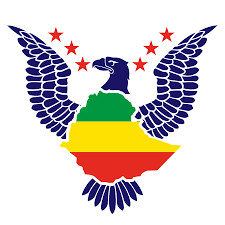
WASHINGTON, DC / ACCESSWIRE / February 7, 2024 / In the face of ongoing and lethal human rights violations perpetrated by Prime Minister Abiy Ahmad's regime, coupled with an escalating famine, the American Ethiopian Public Affairs Committee (AEPAC) unequivocally denounces the Ethiopian government's decision on Friday to extend the State of Emergency in the Amhara region.

Ethiopian tricolor and eagle
The severity of the humanitarian crisis in Ethiopia has been underscored by disturbing reports of a merciless and deadly massacre conducted by government forces in the village of Merawi, located approximately 35 kilometers from Bahir Dar City, the seat of the regional government in the Amhara region. As detailed by the BBC, which conducted interviews with numerous eyewitnesses, security forces carried out door-to-door raids on Jan. 28, 2024, resulting in the tragic deaths of up to 85 civilians, an act of genocide, with some of the victims brutally shot on sidewalks.
The massacre of innocent villagers unfolded in the aftermath of a deadly clash between Ethiopian government soldiers and the widely supported regional militia known as Fano. This incident represents a disturbing escalation within the ongoing crisis in Amhara in which government drone-strikes have killed civilians and destroyed religious shrines and other landmarks while soldiers have engaged in reprehensible acts of rape and burning homes and local food supplies.
In the aftermath of the Merawi massacre, the BBC reported confirmation from a regional office of the Ethiopian Human Rights Commission (EthioHRC) regarding the assault on innocent civilians. Eyewitnesses who spoke to the BBC described a nightmarish scene in which Ethiopian defense forces entered the village at 5 a.m. - after members of Fano had departed - and rounded up residents.
One man recounted to the British news service that government troops took his brother along with 12 others from their homes, marched them to a paved area, and executed them. Another villager grimly reported, "They killed a child with five bullets and dumped him on the cobbles in our neighborhood."
Merely four days after the harrowing events on Feb. 2, the Ethiopian Parliament voted to prolong the State of Emergency in Amhara for an additional six months. This extension grants the government authority to enforce curfews, restrict individuals' movement, and prohibit public gatherings. After the vote, Daniel Bekele, head of EthioHRC, posted that he was "gravely concerned" about the devastating impact that extending the State of Emergency would have on the region's accelerating humanitarian crises.
The grim reality is that the extension of the State of Emergency will enable the Abiy regime to persist in its brutal suppression of the region, and violence that has already claimed thousands of lives and has been linked to a litany of crimes against humanity. In addition to the mounting death toll caused by violent actions, including house-to-house raids and missile strikes from drones supplied by external actors like Turkey and the United Arab Emirates, Amhara is also part of a wider swath of northern Ethiopia grappling with an intensifying famine.
Last Friday, a top United Nations official warned that northern Ethiopia is threatened by "severe water shortages, dried pastures, and reduced harvests," which are "impacting millions of lives of human beings and livestock, with reports of food insecurity and rising malnutrition." Officials report that almost 400 people have already lost their lives in Amhara and the neighboring Tigray region. The prevailing consensus among experts is that the persistent conflict has been the primary catalyst for the hunger crisis, though the area is additionally grappling with the devastating effects of a severe drought.
AEPAC, grounded in the mission of promoting pro-Ethiopia policies and fortifying the enduring ties between the United States and Ethiopia, calls upon the U.S. Department of State, the U.S. Congress, and the U.S. Agency for International Development to use all available diplomatic, development, and legal tools to pressure the Abiy Ahmed government to end the State of Emergency in Amhara, cease its oppressive measures in Amhara and other parts of Ethiopia, and prioritize the immediate delivery of essential humanitarian aid. Ending the unnecessary State of Emergency in Amhara and withdrawing its forces is a critical first step to restore peace to the region and the nation.
AEPAC also urges the Tom Lantos Human Rights Commission, a bipartisan panel established by the U.S. Congress, to urgently convene hearings and draw attention to a rapidly intensifying large-scale humanitarian crisis in Ethiopia, a country of 120 million people. This crisis in Ethiopia, regrettably, has been grievously overlooked by a global community collectively focused on conflicts in the Middle East and Eastern Europe. It is imperative that the commission vigorously amplifies awareness and advocates for decisive action to address this pressing issue.
The American Ethiopian Public Affairs Committee's (AEPAC) core mission is to strengthen and enhance the century-old relationship between the United States and the people of Ethiopia. In the face of the ongoing crisis in Ethiopia, AEPAC stands as a staunch advocate for peace, justice, and the welfare of the Ethiopian people. AEPAC remains dedicated to amplifying the voices of the Ethiopian people and promoting a positive and cooperative relationship between the United States and the people of Ethiopia, based on our shared values of democracy, justice, and human rights.
Contact Information
Christopher Drumm
Consultant
cpchristopher@drummanddaughters.com
2153707874
SOURCE: American Ethiopian Public Affairs Committee
View the original press release on newswire.com.
